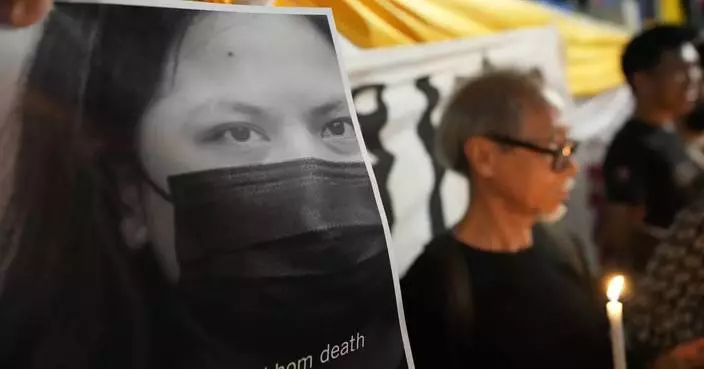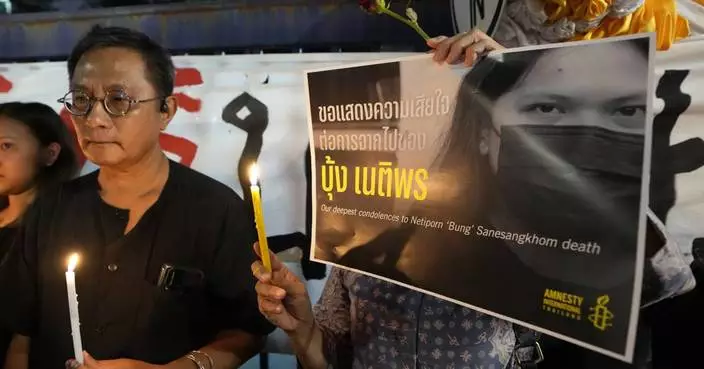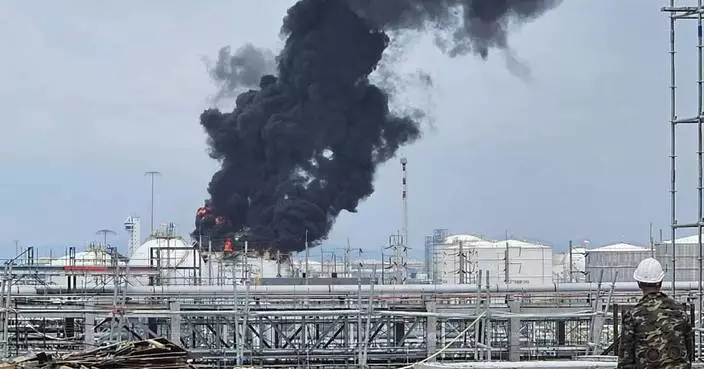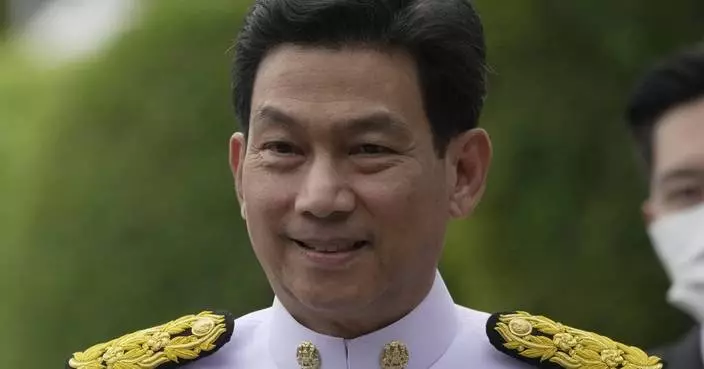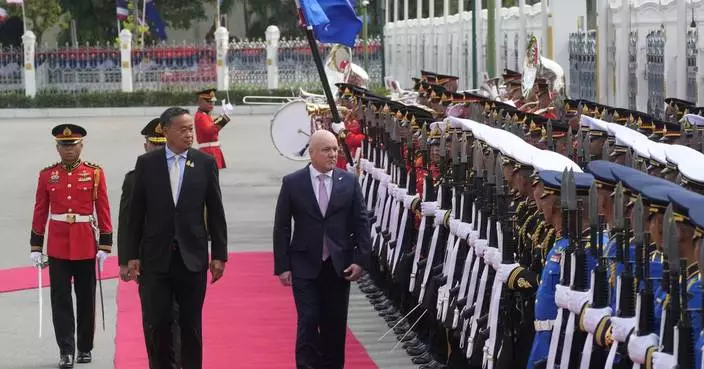Tucked in his cramped clothing stall in an enormous Thai mall, Pirumchai Asiram sits on a plastic chair flanked by two worlds — bright, vibrantly colored shirts and dresses to his right, neat stacks of somber apparel in blacks and whites to his left. Ask him which sells better, and he'll smile.
"Not these," he says emphatically, pointing to the loud clothing. "These brighter things we sell for foreigners. Thai people, they don't wear this kind of design since the king passed away."
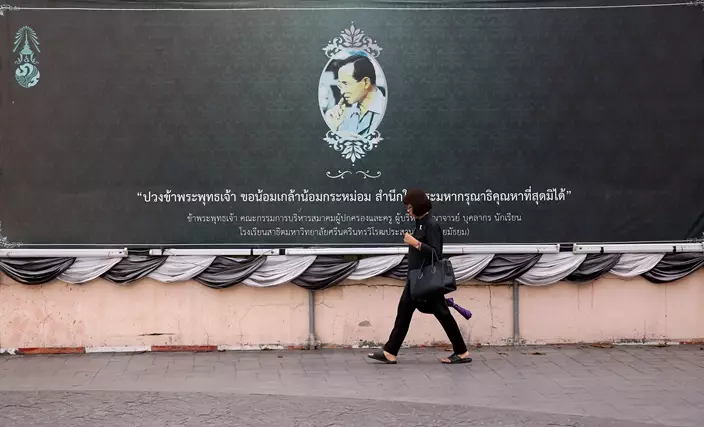
In this Oct. 10, 2017, photo, a woman dressed in black walks past a giant black toned memorial, edged with bunting, in honor of the late King of Thailand in Bangkok, Thailand. The muted colors of mourning have settled over Bangkok once again in recent weeks as the country marks a year since the death of its beloved monarch, King Bhumibol Adulyadej, and prepares for the national spectacle of his cremation next week. (AP Photo/Wally Santana)
Walk the bargain clothing stalls in MBK Center and you'll hear quite a bit of this. At the Orchid clothing store, vendor Arunee Narasri reports shops selling up to 10,000 Thai baht (more than $300) a day in bargain black clothing. Supak Sonpech, who sells black-and-white college uniforms, says it has become everyone's go-to purchase: "When I go out to buy clothes now, I don't look at anything but black and white."
And as the clothing stalls of MBK Center go, so goes the Thai capital.
The muted colors of mourning have settled over Bangkok once again in recent weeks as the country marks a year since the death of its beloved monarch, King Bhumibol Adulyadej, and prepares for the national spectacle of his cremation next week. Walking once-color-drenched streets evokes the moment when the Technicolor-soaked land of Oz ebbs back into the blacks and grays of Kansas.
"The fashion itself hasn't really changed, but the whole color tone of the city has," says Kotchamon Arsa, owner of a Bangkok shop called Southern Star, which overflows with hundreds of pairs of blue jeans. She reports that people are still buying them, but favoring darker hues of denim to pair with black shirts.
"People still love fashion," she says. "We're just using more appropriate tones."
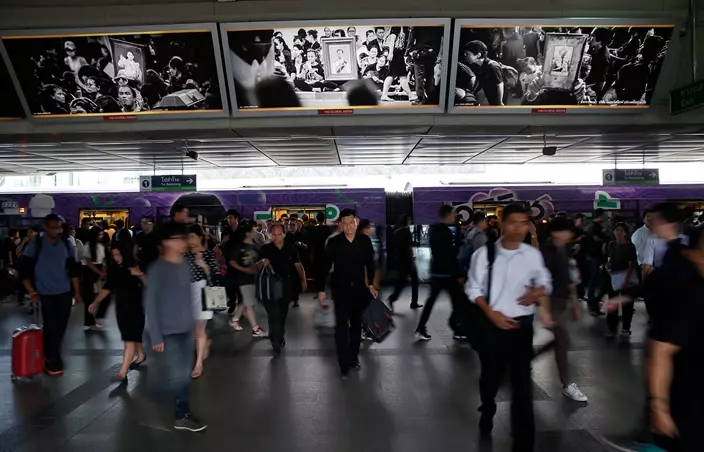
In this Monday, Oct. 16, 2017, photo, Skytrain passengers dressed primarily in black come and go under black and white images in memory of the late King of Thailand at a station platform in Bangkok, Thailand. The muted colors of mourning have settled over Bangkok once again in recent weeks as the country marks a year since the death of its beloved monarch, King Bhumibol Adulyadej, and prepares for the national spectacle of his cremation next week. (AP Photo/Wally Santana)
To understand what's taking place this month, let's flash back to Oct. 13, 2016, when the overwhelmingly beloved king, also known as Rama IX, died at age 88. The country immediately went into a period of mourning, which played out on the streets of Bangkok in very visible ways. In a matter of days, the city's entire color palette shifted.
Black-and-white bunting went up on walls. Colors drained from public-facing screens, from ATMs to electronic billboards to commuter-rail signs. Google Thailand replaced its vibrant homepage with blacks and grays.
Most of all, though, it was the apparel that changed — for men and women alike. A city typically festooned with brightly colored commuters and pedestrians took on a more somber feel. It wasn't that absolutely everyone wore black — though some who didn't found themselves castigated — but it, and white, became the dominant colors.
Dyeing stations popped up around town so people could turn loud clothing into more muted outfits. The pro-monarchy national government encouraged fabric manufacturers to step up production of black textiles and warned against price-gouging. Heads of offices were expected to wear black; in places where white shirts were expected, black armbands made the same statement.
It wasn't that no one had worn black before (though the capital's tropical climate impacted such decisions); it was that the shift became a statement, a matter of discussion, a symbol of respect. People genuinely loved Rama IX, yes, but at the same time no one wanted to be seen as disrespectful.

In this Oct. 11, 2017, photo, a retailer tidies her black garments, worn in honor of the late King of Thailand, as she opens for business in Bangkok, Thailand. The muted colors of mourning have settled over Bangkok once again in recent weeks as the country marks a year since the death of its beloved monarch, King Bhumibol Adulyadej, and prepares for the national spectacle of his cremation next week. (AP Photo/Wally Santana)
In the intervening months between the intensive mourning period after the king's death and the current one a year later, color crept back into the city, though observation over time suggests that it never quite came back entirely. On one recent morning, for example, when a door opened on Bangkok's busy BTS Skytrain to disgorge commuters, 18 of 20 people getting off the train wore various permutations of black. (One notable exception: Buddhist monks, still wearing their saffron robes.)
Since the beginning of this month, however, more muted colors have returned with even more vigor. A flier is circulating that depicts 25 muted hues — from light browns to dark greens and, of course, black — that are considered appropriate for the month.
Despite the official flexibility, though, black dominates. And it's hard not to wonder whether the change will endure after the Oct. 26 cremation — particularly since many less wealthy people may not have money to bring back a more colorful wardrobe.
Officially, the government has given its approval for a return to earlier style.
"After the mourning period has ended, people can return to their colored clothes, wearing whatever they would have before Oct. 13 last year," said Thongthong Chandrangsu, an expert on royal traditions and a member of the funeral organizing committee. "We have to understand that this is also part of a tradition as well."
But Pear Kulthanan, a fashionable twentysomething Thai woman who has spent a great deal of time abroad, doesn't expect a sea change.

In this Oct. 11, 2017, photo, clothing retailer Pirumchai Asiram tidies up black shirts for sale as he starts another day of business in Bangkok, Thailand. The muted colors of mourning have settled over Bangkok once again in recent weeks as the country marks a year since the death of its beloved monarch, King Bhumibol Adulyadej, and prepares for the national spectacle of his cremation next week. (AP Photo/Wally Santana)
"Unless the fashion trend is all-black, I don't think people will continue to wear monochrome colors unless they (were) already wearing it before the mourning," she says. "Fashion in Thailand is influenced mostly by Korea and Japan. If they start wearing black, you would start to see people wearing more black."
But there is, perhaps, an additional dimension to it all — a political dimension that transcends pure protocol.
Paul Chambers, a lecturer at Naresuan University's College of ASEAN Community Studies, has noticed an increase in the concentration of black clothing as Thais get geographically closer to the king — more in areas nearer to Bangkok, even more in the capital itself and the most in the part of the city around the palace.
Chambers suspects Bangkok's black saturation could continue after the cremation — because of both affection for the departed Rama IX and considerations for his son, the new king, Rama X.
"I wouldn't be surprised if the powers that be would want people to wear black, maybe next year, maybe for a few more years, just to show the connection, the transition between this king and the next," Chambers says. "There is certainly this engine that drives adulation for the traditional institution."
And though many expect a colorful Bangkok to return, Asiram, the clothing-stall owner, sees it differently. "I think the black will stay," he says. "People love the king a lot. Even after the funeral, I think the city will still look sad."
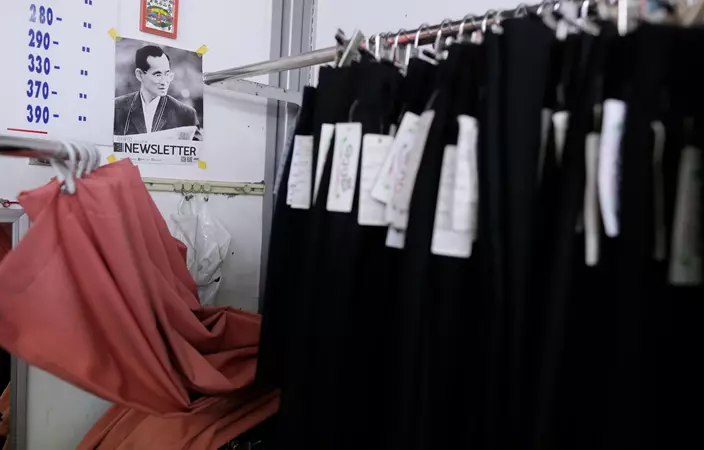
In this Oct. 11, 2017, photo, a portrait of the late King of Thailand is mounted to the wall next to a seamstress's rack of altered black garments, worn in honor of him in Bangkok, Thailand. The muted colors of mourning have settled over Bangkok once again in recent weeks as the country marks a year since the death of its beloved monarch, King Bhumibol Adulyadej, and prepares for the national spectacle of his cremation next week. (AP Photo/Wally Santana)
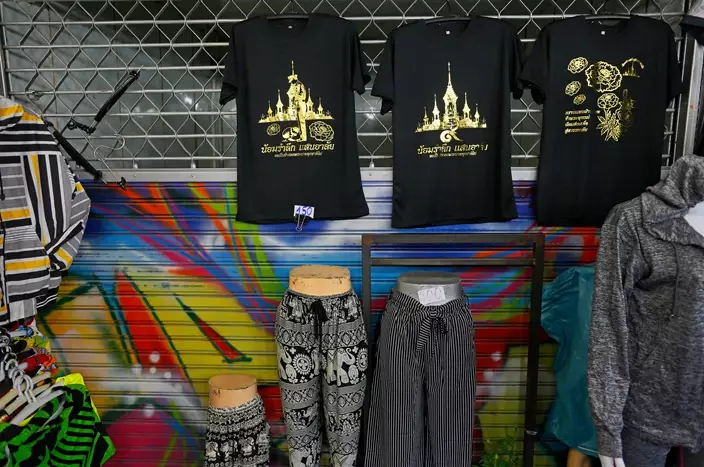
In this Oct. 11, 2017, photo, a clothing shop displays black t-shirts for sale, worn in honor of the late King of Thailand, in Bangkok, Thailand. The muted colors of mourning have settled over Bangkok once again in recent weeks as the country marks a year since the death of its beloved monarch, King Bhumibol Adulyadej, and prepares for the national spectacle of his cremation next week. (AP Photo/Wally Santana)
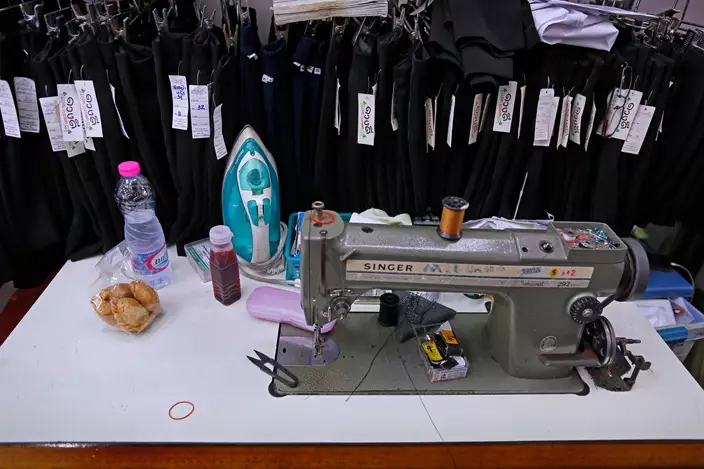
In this Oct. 11, 2017, photo, a seamstress's sewing machine sits in front of a rack altered black garments, worn in honor of the late King of Thailand, in Bangkok, Thailand. The muted colors of mourning have settled over Bangkok once again in recent weeks as the country marks a year since the death of its beloved monarch, King Bhumibol Adulyadej, and prepares for the national spectacle of his cremation next week. (AP Photo/Wally Santana)
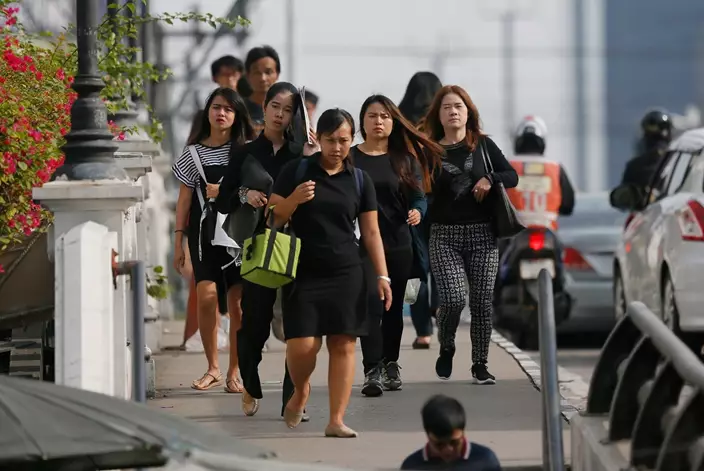
In this Oct. 12, 2017, photo, morning commuters cross a bridge dressed in black in honor of the late King of Thailand in Bangkok, Thailand. The muted colors of mourning have settled over Bangkok once again in recent weeks as the country marks a year since the death of its beloved monarch, King Bhumibol Adulyadej, and prepares for the national spectacle of his cremation next week. (AP Photo/Wally Santana)
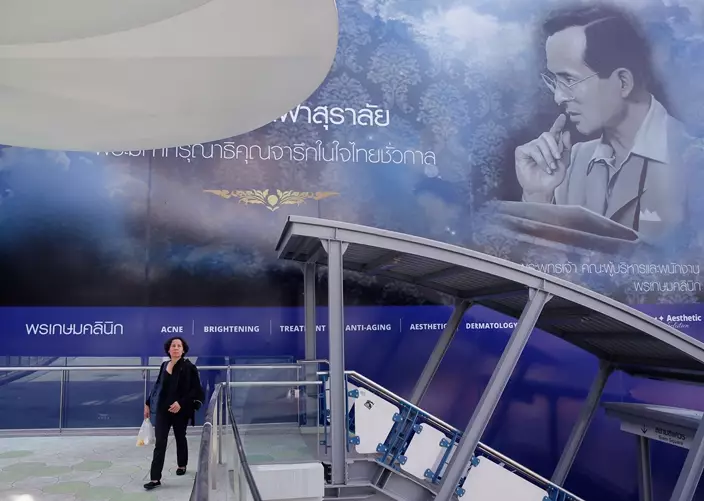
In this Monday, Oct. 16, 2017, photo, a woman dressed in black walks across a pedestrian bridge past a giant memorial in honor of the late King of Thailand in Bangkok, Thailand. The muted colors of mourning have settled over Bangkok once again in recent weeks as the country marks a year since the death of its beloved monarch, King Bhumibol Adulyadej, and prepares for the national spectacle of his cremation next week. (AP Photo/Wally Santana)








